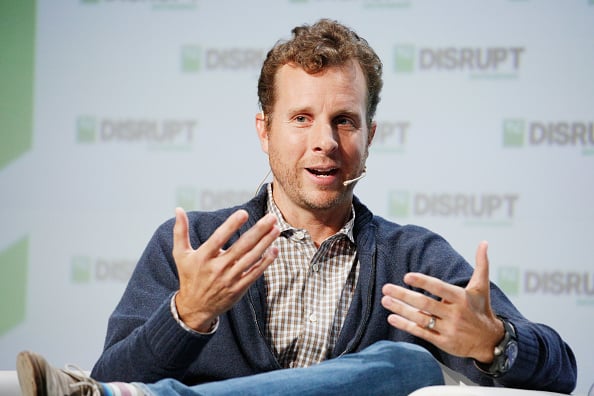What is Jamie Siminoff's net worth?
Jamie Siminoff is an American entrepreneur who has a net worth of $300 million. Jamie Siminoff is best known as the founder and inventor behind Ring, the home security company that transformed the modern doorbell. Siminoff's journey from a rejected "Shark Tank" contestant to a multi-millionaire innovator is one of the most inspiring startup stories of the past decade. In 2013, he appeared on "Shark Tank" pitching his Wi-Fi-enabled video doorbell, then called DoorBot. None of the sharks invested, and Kevin O'Leary's offer of a loan-plus-royalty deal was rejected. Yet that public rejection sparked a wave of interest and sales that ultimately kept the company alive. Siminoff rebranded DoorBot as Ring, secured major venture backing, landed retail distribution deals with Best Buy, Home Depot, and Target, and built a near-monopoly in the video doorbell market. In 2018, Amazon acquired Ring for more than $1 billion, earning Siminoff an estimated $300–$350 million payday. His story embodies the classic entrepreneurial mantra of perseverance, creativity, and conviction in one's vision.
Early Life and Inspiration
Jamie Siminoff grew up in New Jersey, where he showed an early passion for tinkering and invention. He studied entrepreneurship at Babson College, known for its emphasis on business innovation. The inspiration for what became Ring struck at home, when his wife complained that she couldn't hear the doorbell while working. Siminoff, already an experienced inventor with several small ventures under his belt, began developing a Wi-Fi-connected doorbell that sent video and alerts directly to the homeowner's smartphone. He drained his personal savings to produce the first batch of 5,000 devices from a factory in Taiwan, calling the product "DoorBot."
"Shark Tank" Rejection and DoorBot's Near Collapse
In 2013, while struggling to keep DoorBot afloat, Siminoff met someone who suggested he pitch the product on ABC's "Shark Tank." He quickly applied, filmed his segment that summer, and appeared on the show's November 2013 episode. He sought $700,000 for 10% equity, valuing the company at $7 million. The sharks were skeptical. Only Kevin O'Leary made an offer — a complex loan-plus-royalty deal that Siminoff declined. He walked away empty-handed and visibly disappointed.
Yet the exposure changed everything. Within a month of the episode airing, DoorBot sold over $1 million worth of units. The publicity effectively saved the company from collapse. Siminoff poured his energy into improving the hardware, personally troubleshooting issues for customers, answering every support email, and even visiting homes to fix faulty devices. Over the next year, DoorBot evolved from a buggy gadget with poor video quality and spotty Wi-Fi into a reliable home security product.
Rebranding and Investment from Tech Heavyweights
In 2014, Siminoff partnered with Foxconn, the manufacturer of Apple's iPhones, to redesign the doorbell and improve production quality. Around the same time, investor Hamet Watt of Upfront Ventures joined the company and encouraged Siminoff to rename it "Ring" — a name that reflected both the sound of a doorbell and the idea of creating a protective ring of security around the home. Siminoff also spent $1 million to acquire the coveted Ring.com domain name.
With a stronger product and brand, Siminoff secured retail placements in major stores and attracted new investors. In 2015, Richard Branson became an investor after witnessing the device in action on his private island; he later contributed part of a $28 million funding round that grew into more than $200 million in total investment from major venture firms. In 2016, basketball legend Shaquille O'Neal became a brand ambassador and shareholder, starring in commercials that demonstrated Ring's real-world impact.

Getty
Market Dominance and Amazon Acquisition
By 2017, Ring commanded roughly 97% of the U.S. video doorbell market. Siminoff's product had expanded into a full ecosystem of connected security devices, including floodlight cameras, alarms, and smart home integrations. In a Los Angeles pilot program, Ring's collaboration with the LAPD led to a 55% drop in neighborhood burglaries after Ring doorbells were installed in just 10% of homes — tangible proof of the product's deterrent power.
As competitors like Google's Nest and ADT began entering the smart-doorbell market, Ring's success caught the attention of Amazon. In early 2018, Amazon acquired the company for an estimated $1.2 to $1.8 billion. Siminoff reportedly owned about 30% of the company, giving him a pre-tax windfall of roughly $300 to $350 million. The acquisition allowed Amazon to integrate Ring into its smart-home lineup alongside Alexa and other connected devices, securing its leadership in home security technology.
Legacy and Later Career
Following the sale, Siminoff remained with Ring as CEO and later served as Chief Inventor after transitioning leadership in 2023. In a symbolic full-circle moment, he returned to "Shark Tank" in 2018 as a guest investor on the Season 10 premiere — this time sitting alongside the same sharks who once rejected him. The episode underscored how dramatically his fortunes had changed.
Ring's success has inspired a generation of hardware entrepreneurs by proving that consumer electronics startups — long considered high-risk — can still thrive with persistence and clever marketing. Siminoff is also recognized for his customer-first approach; he famously included his personal email on every Ring box so users could reach him directly, even years into the company's growth.
Personal Life and Philosophy
Jamie Siminoff lives in Southern California with his wife and family. He has spoken frequently about the emotional toll and financial risks of entrepreneurship, describing how close he came to losing everything before Ring took off. His philosophy emphasizes grit over genius: "You have to believe in what you're doing when no one else does," he once said. Siminoff continues to invent and invest in technologies that, in his words, "make neighborhoods safer and lives easier." His transformation from a struggling inventor to a multi-millionaire innovator remains one of the most compelling rags-to-riches stories in modern tech.
/2018/02/jamie-siminoff.jpg)
/2023/05/aaron-krause.png)
/2020/01/robert.jpg)
/2015/11/Chris-Sacca.jpg)
/2020/06/jb2.jpg)
/2016/09/Richard-Branson.jpg)
/2020/01/lopez3.jpg)
:strip_exif()/2009/09/P-Diddy.jpg)
/2020/04/Megan-Fox.jpg)
/2018/03/GettyImages-821622848.jpg)
/2009/09/Cristiano-Ronaldo.jpg)
/2019/10/denzel-washington-1.jpg)
/2019/11/GettyImages-1094653148.jpg)
/2020/02/Angelina-Jolie.png)
/2019/04/rr.jpg)
:strip_exif()/2015/09/GettyImages-476575299.jpg)
/2017/02/GettyImages-528215436.jpg)
/2018/02/jamie-siminoff.jpg)
/2016/09/Richard-Branson.jpg)
/2019/06/GettyImages-1038579250.jpg)
/2020/01/lori.jpg)
/2014/05/GettyImages-159256797.jpg)
/2020/01/robert.jpg)
/2014/01/GettyImages-498356090.jpg)
/2009/11/George-Clooney.jpg)
/2020/06/taylor.png)
/2009/09/Brad-Pitt.jpg)